Unit 3 Pardon Me! Lesson 23 Supper with the Bradshaws
文档属性
| 名称 | Unit 3 Pardon Me! Lesson 23 Supper with the Bradshaws |
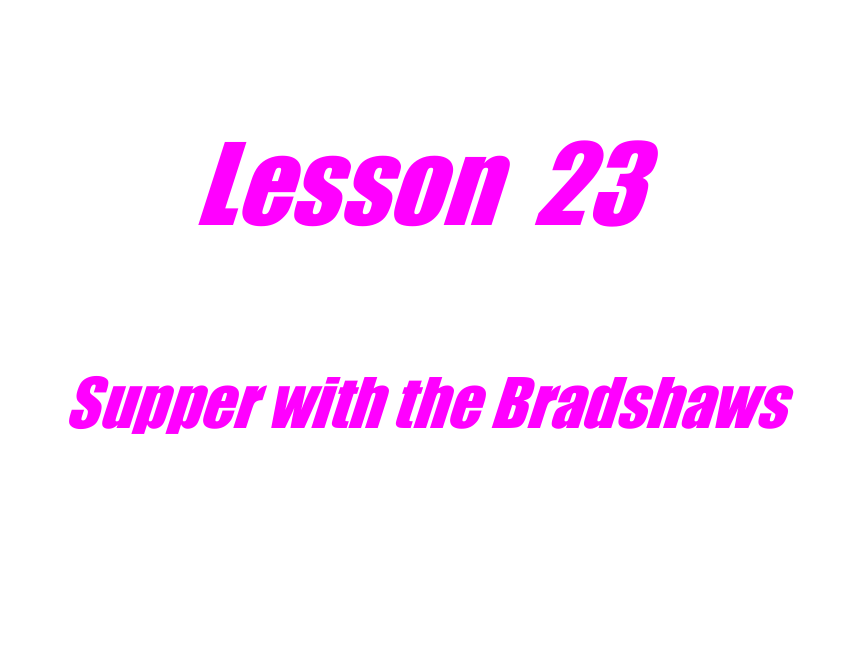
|
|
| 格式 | rar | ||
| 文件大小 | 25.3KB | ||
| 资源类型 | 教案 | ||
| 版本资源 | 冀教版 | ||
| 科目 | 英语 | ||
| 更新时间 | 2011-01-16 00:00:00 | ||
图片预览

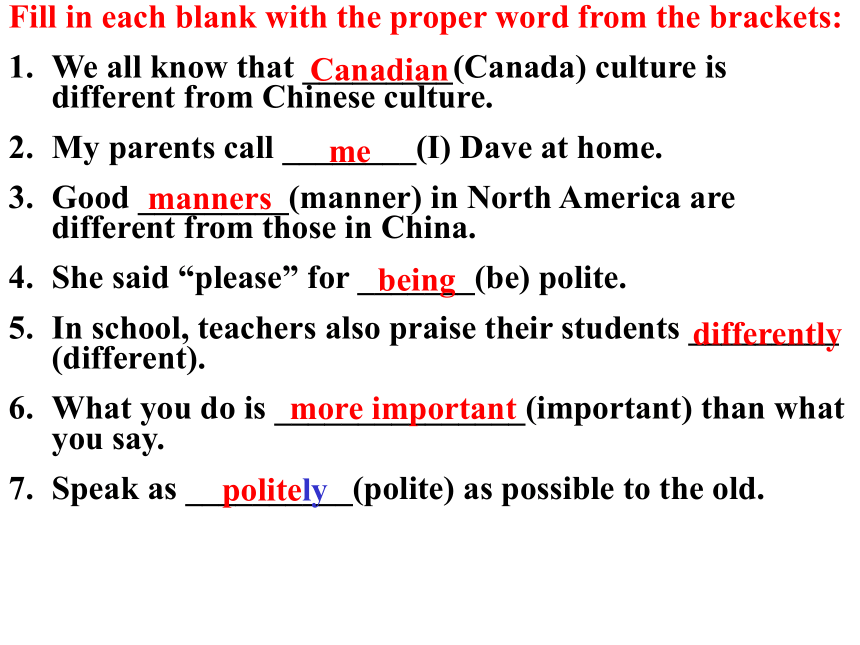
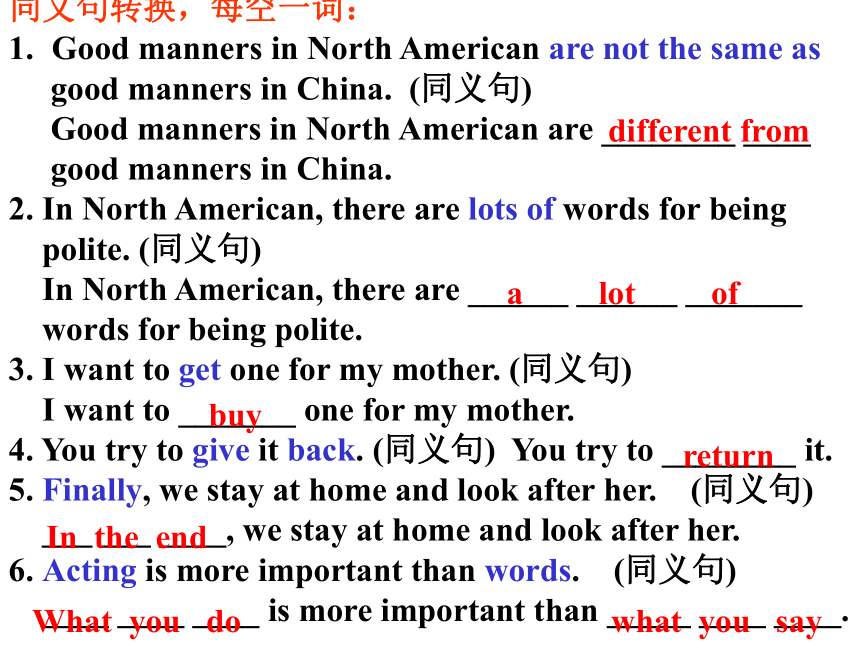
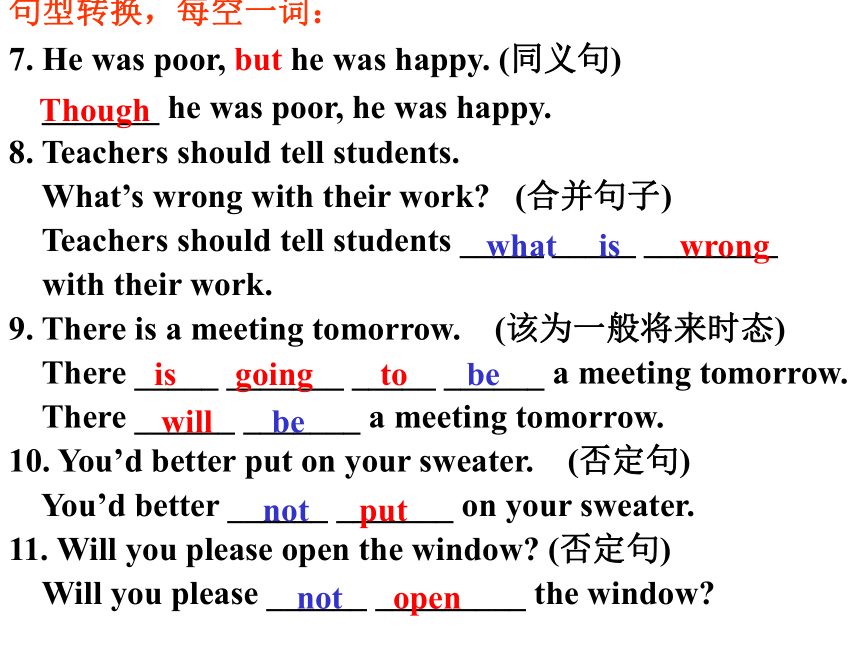
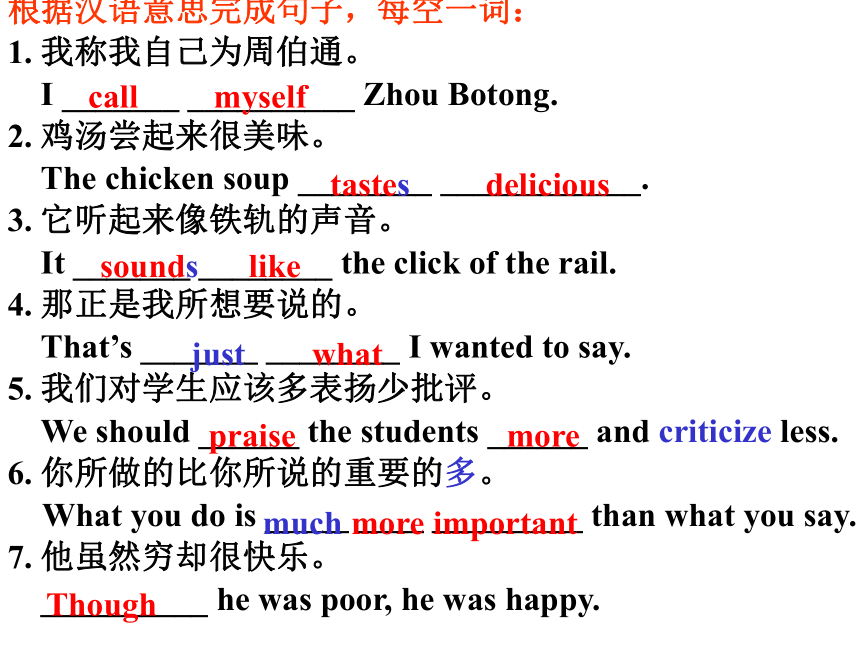
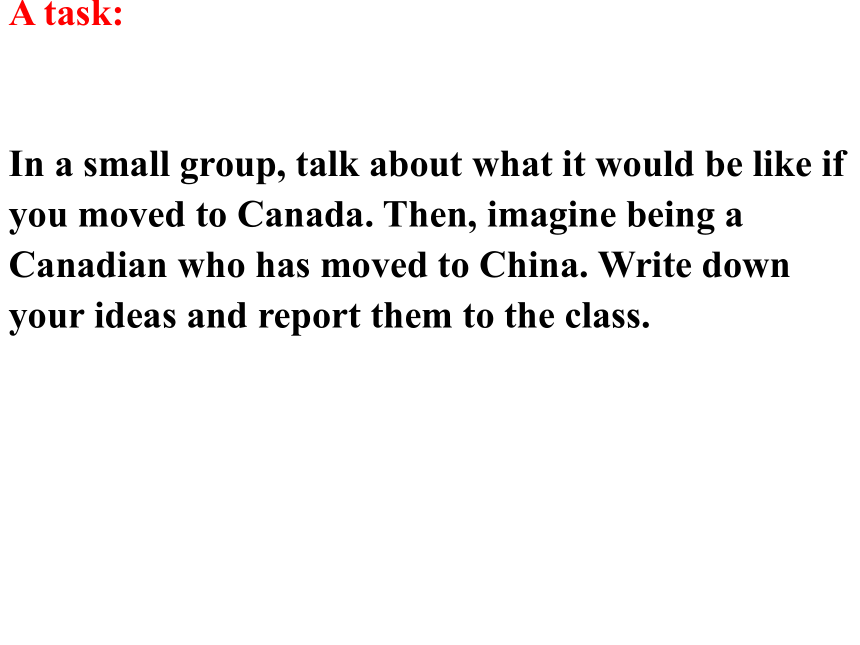
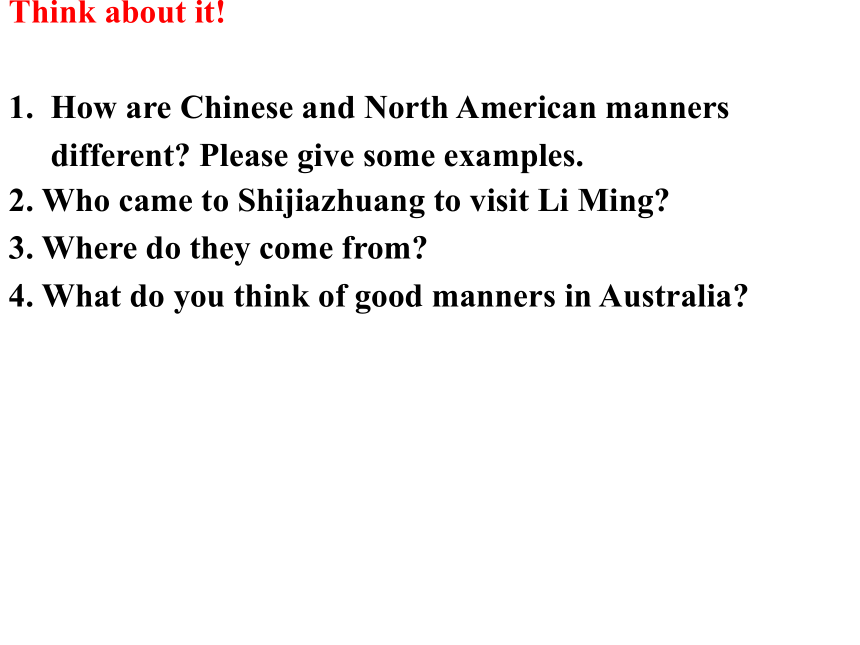
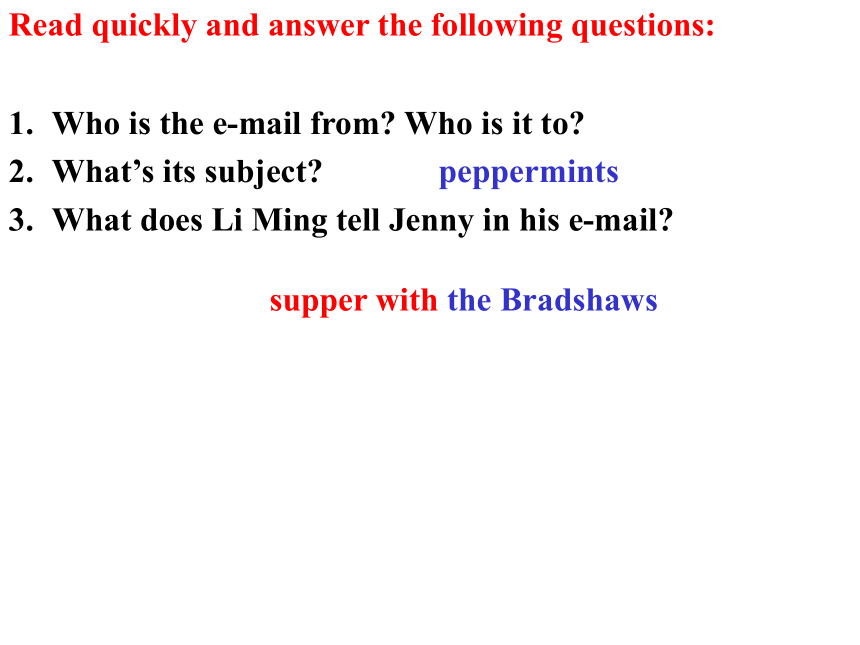
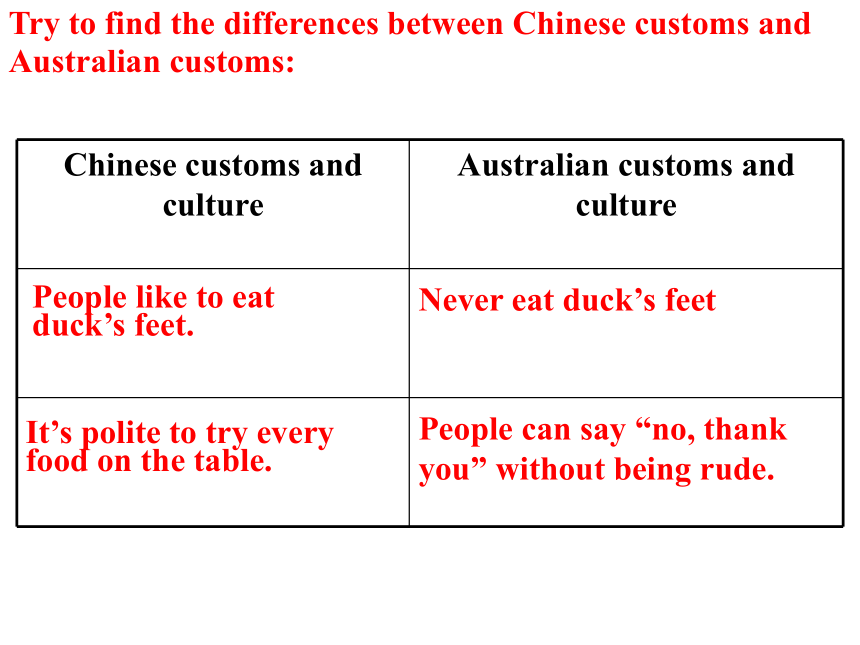
文档简介
课件21张PPT。
Lesson 23
Supper with the BradshawsFill in each blank with the proper word from the brackets:
We all know that _________(Canada) culture is different from Chinese culture.
My parents call ________(I) Dave at home.
Good _________(manner) in North America are different from those in China.
She said “please” for _______(be) polite.
In school, teachers also praise their students _________ (different).
What you do is _______________(important) than what you say.
Speak as __________(polite) as possible to the old.
Canadian memannersdifferentlymore importantbeingpolitely同义句转换,每空一词:
Good manners in North American are not the same as
good manners in China. (同义句)
Good manners in North American are ________ ____
good manners in China.
2. In North American, there are lots of words for being
polite. (同义句)
In North American, there are ______ ______ _______
words for being polite.
3. I want to get one for my mother. (同义句)
I want to _______ one for my mother.
4. You try to give it back. (同义句) You try to ________ it.
5. Finally, we stay at home and look after her. (同义句)
___ ___ ____, we stay at home and look after her.
6. Acting is more important than words. (同义句)
____ ____ ____ is more important than _____ ____ ____.different frombuyreturnIn the enda lot ofWhat you dowhat you say句型转换,每空一词:
7. He was poor, but he was happy. (同义句)
_______ he was poor, he was happy.
8. Teachers should tell students.
What’s wrong with their work? (合并句子)
Teachers should tell students _____ _____ ________
with their work.
9. There is a meeting tomorrow. (该为一般将来时态)
There _____ _______ _____ ______ a meeting tomorrow.
There ______ _______ a meeting tomorrow.
10. You’d better put on your sweater. (否定句)
You’d better ______ _______ on your sweater.
11. Will you please open the window? (否定句)
Will you please ______ _________ the window? is going to bewill benot putwhat is wrongnot openThough根据汉语意思完成句子,每空一词:
1. 我称我自己为周伯通。
I _______ __________ Zhou Botong.
2. 鸡汤尝起来很美味。
The chicken soup ________ ____________.
3. 它听起来像铁轨的声音。
It _______ ________ the click of the rail.
4. 那正是我所想要说的。
That’s _______ ________ I wanted to say.
5. 我们对学生应该多表扬少批评。
We should ______ the students ______ and criticize less.
6. 你所做的比你所说的重要的多。
What you do is _____ ____ _________ than what you say.
7. 他虽然穷却很快乐。
__________ he was poor, he was happy. call myself tastes delicious sounds like just what praise more much more important Though A task:
In a small group, talk about what it would be like if
you moved to Canada. Then, imagine being a
Canadian who has moved to China. Write down
your ideas and report them to the class.Think about it!
1. How are Chinese and North American manners
different? Please give some examples.
2. Who came to Shijiazhuang to visit Li Ming?
3. Where do they come from?
4. What do you think of good manners in Australia?
Read quickly and answer the following questions:
Who is the e-mail from? Who is it to?
What’s its subject?
What does Li Ming tell Jenny in his e-mail?
peppermints supper with the Bradshaws Never eat duck’s feet
People can say “no, thank you” without being rude.Try to find the differences between Chinese customs and Australian customs:People like to eat duck’s feet.
It’s polite to try every food on the table.Language notes:1. It was great to meet Bruce face to face, after having written to him for so long. face to face “面对面”
hand in hand “手拉手”
neck and neck “并驾齐驱”
shoulder and shoulder “肩并肩” They’ve often talked to each other on the telephone, but
they’ve never met each other face to face. =It was great to meet Bruce face to face, after I had written to him for so long. write sb. write to sb. write a letter to sb. have/get/receive a letter from sb. hear from sb.Language notes:2. But he and his father sometimes had trouble with Chinese customs and culture. have trouble with … “在……有麻烦”
have some trouble with … “在……有一些麻烦”
have much trouble with … “在……有很多麻烦”
have no trouble with … “在……没有麻烦” 他们在工作中有一些麻烦。
我们的新汽车很让人伤脑筋。 They have some trouble with their work. We are having trouble with our new car. trouble n. “困难;麻烦” What’s wrong/the matter/the trouble with sb./sth?Language notes:3. Last night, my parents invited them to a restaurant for supper. invite sb. “邀请某人”
invite sb. to a place “邀请某人到什么地方”
invite sb. to do sth. “邀请某人做某事” 昨天她邀请我们参加她的聚会。
他邀请她和他一起唱歌。 Yesterday she invited us to her party. He invited her to sing the song together with him.4. While we ate, Bruce and his father praised most of the food. when 引导的从句可用瞬间动词,也可用延续性动词
while 用于表示同时进行的两个延续性动作相伴随而发
生,或用于两个同类动作相对比的主从句中。Language notes: He went home __________ he finished his homework.
He was listening to music ____________ he was doing his
homework.
Some students were reading _______ others were singing.5. I explained to my father, in Chinese, that Western customs are different. People can say “no, thank you” without being rude and that Western people never eat duck’s feet! without prep. “没有”whenwhen/whilewhile 没有你的帮助,我不能做这件事。
她从我身边走过而没有看见我。
没有健康就不可能有幸福。 I can’t do it without your help. She passed without seeing me. Without health, happiness is impossible.Language notes:6. In good Chinese tradition, I told him that I enjoyed it. tradition n. “传统” It is a tradition that the young look after the old in their
family.
We must keep up fine tradition.7. I don’t know what we’ll do with them. in good Chinese tradition “按照中国的优良传统” do with “(怎样)处理;安排;办” 多和what连用
deal with和 do with意思接近,但常和how连用 ________ have you done with the old bike?
= ______ have you dealt with the old bike?WhatHowFill in the blanks with proper prepositions:
We just came home ________ the airport.
It was great to meet Bruce face _______ face, after having written to him ________ so long.
They sometimes had trouble _______ Chinese customs and culture.
Last night, my parents invited them _______ a restaurant ________ supper.
I explained _____ my father, in Chinese, that Western customs are different.
People can say “no, thank you” ________ being rude.from toforwithtofor to withoutFill in the blanks with proper prepositions:
7. ______ the end of the meal, Mr. Bradshaws opened a box ______ peppermint candies.
8. He passed the box _________ everyone.
9. ______ good Chinese tradition, I told him that I enjoyed it.
______ the airport today, he gave us a big box of peppermints _______ a gift. I don’t know what we’ll do _________ them.
Bye _______ now.
At oftoInAt as withfor同义句转换,每空一词:
He went to school without breakfast.
He went to school without ________________ breakfast.
2. They each have a book.
They have a book _________.
_______ _____ ______ ________ a book.
3. The woman got a letter from his son.
The woman ______________ a letter from his son.
The woman _______ _________ his son.
4. What’s wrong with you?
What’s _______ _________ with you?
What’s _________ _________ with you?eating/having Each of them received/hadhaseachheard fromthe matterthe trouble同义句转换,每空一词:
5. I certainly wanted to know what my parents would do.
I certainly __________ what my parents would do.
6. I don’t know how we’ll deal with them!
I don’t know ________ we’ll do with them!
7. To meet Bruce face to face was great for Li Ming.
_______ was great _______ Li Ming _______ meet Bruce face to face.
what It wonderedfor to根据汉语意思完成句子,每空一词:
1. 我在英语学习中有一些麻烦。
I have some _________ ________ my English study.
2. 交通事故之后,他的腿有毛病。
After the traffic accident, there was __________ ______ ________ his leg.
3. 上周日我邀请我的朋友去一家饭店吃饭。
I ________ my friend _______ a restaurant for dinner last Sunday.
4. 打扰一下,你能说慢点吗?我听不清你说什么。
Excuse me. Can you _________ it slowly? I can’t ________ you clearly.trouble with something wrongwith invited to say hear 根据汉语意思完成句子,每空一词:
5. 作为抗日英雄,他经常给我们讲关于战争的故事。
_______ an Anti-Japanese hero, he always _______ us stories ___________ wars.
6. 他没吃早饭就匆匆上学去了。
He hurried to school ________ ____________ breakfast.
7. 按照中国的优良传统,我告诉他我喜欢。
___ good _______ _________, I told him that I enjoyed it.
8. 你把我的自行车怎么样了?
_________ have you ________ ________ my bike?
9. 我把作业忘在家里了。
I _______ my homework at home.As tells about/on without having/eating In Chinese tradition What done with left A task:
You are a guest at a dinner but you feel very
uncomfortable. What’s wrong? Is it the food or the
drinks? Is it the table manners of the people eating
with you? Make up a dialogue about the dinner
and act it out.
Lesson 23
Supper with the BradshawsFill in each blank with the proper word from the brackets:
We all know that _________(Canada) culture is different from Chinese culture.
My parents call ________(I) Dave at home.
Good _________(manner) in North America are different from those in China.
She said “please” for _______(be) polite.
In school, teachers also praise their students _________ (different).
What you do is _______________(important) than what you say.
Speak as __________(polite) as possible to the old.
Canadian memannersdifferentlymore importantbeingpolitely同义句转换,每空一词:
Good manners in North American are not the same as
good manners in China. (同义句)
Good manners in North American are ________ ____
good manners in China.
2. In North American, there are lots of words for being
polite. (同义句)
In North American, there are ______ ______ _______
words for being polite.
3. I want to get one for my mother. (同义句)
I want to _______ one for my mother.
4. You try to give it back. (同义句) You try to ________ it.
5. Finally, we stay at home and look after her. (同义句)
___ ___ ____, we stay at home and look after her.
6. Acting is more important than words. (同义句)
____ ____ ____ is more important than _____ ____ ____.different frombuyreturnIn the enda lot ofWhat you dowhat you say句型转换,每空一词:
7. He was poor, but he was happy. (同义句)
_______ he was poor, he was happy.
8. Teachers should tell students.
What’s wrong with their work? (合并句子)
Teachers should tell students _____ _____ ________
with their work.
9. There is a meeting tomorrow. (该为一般将来时态)
There _____ _______ _____ ______ a meeting tomorrow.
There ______ _______ a meeting tomorrow.
10. You’d better put on your sweater. (否定句)
You’d better ______ _______ on your sweater.
11. Will you please open the window? (否定句)
Will you please ______ _________ the window? is going to bewill benot putwhat is wrongnot openThough根据汉语意思完成句子,每空一词:
1. 我称我自己为周伯通。
I _______ __________ Zhou Botong.
2. 鸡汤尝起来很美味。
The chicken soup ________ ____________.
3. 它听起来像铁轨的声音。
It _______ ________ the click of the rail.
4. 那正是我所想要说的。
That’s _______ ________ I wanted to say.
5. 我们对学生应该多表扬少批评。
We should ______ the students ______ and criticize less.
6. 你所做的比你所说的重要的多。
What you do is _____ ____ _________ than what you say.
7. 他虽然穷却很快乐。
__________ he was poor, he was happy. call myself tastes delicious sounds like just what praise more much more important Though A task:
In a small group, talk about what it would be like if
you moved to Canada. Then, imagine being a
Canadian who has moved to China. Write down
your ideas and report them to the class.Think about it!
1. How are Chinese and North American manners
different? Please give some examples.
2. Who came to Shijiazhuang to visit Li Ming?
3. Where do they come from?
4. What do you think of good manners in Australia?
Read quickly and answer the following questions:
Who is the e-mail from? Who is it to?
What’s its subject?
What does Li Ming tell Jenny in his e-mail?
peppermints supper with the Bradshaws Never eat duck’s feet
People can say “no, thank you” without being rude.Try to find the differences between Chinese customs and Australian customs:People like to eat duck’s feet.
It’s polite to try every food on the table.Language notes:1. It was great to meet Bruce face to face, after having written to him for so long. face to face “面对面”
hand in hand “手拉手”
neck and neck “并驾齐驱”
shoulder and shoulder “肩并肩” They’ve often talked to each other on the telephone, but
they’ve never met each other face to face. =It was great to meet Bruce face to face, after I had written to him for so long. write sb. write to sb. write a letter to sb. have/get/receive a letter from sb. hear from sb.Language notes:2. But he and his father sometimes had trouble with Chinese customs and culture. have trouble with … “在……有麻烦”
have some trouble with … “在……有一些麻烦”
have much trouble with … “在……有很多麻烦”
have no trouble with … “在……没有麻烦” 他们在工作中有一些麻烦。
我们的新汽车很让人伤脑筋。 They have some trouble with their work. We are having trouble with our new car. trouble n. “困难;麻烦” What’s wrong/the matter/the trouble with sb./sth?Language notes:3. Last night, my parents invited them to a restaurant for supper. invite sb. “邀请某人”
invite sb. to a place “邀请某人到什么地方”
invite sb. to do sth. “邀请某人做某事” 昨天她邀请我们参加她的聚会。
他邀请她和他一起唱歌。 Yesterday she invited us to her party. He invited her to sing the song together with him.4. While we ate, Bruce and his father praised most of the food. when 引导的从句可用瞬间动词,也可用延续性动词
while 用于表示同时进行的两个延续性动作相伴随而发
生,或用于两个同类动作相对比的主从句中。Language notes: He went home __________ he finished his homework.
He was listening to music ____________ he was doing his
homework.
Some students were reading _______ others were singing.5. I explained to my father, in Chinese, that Western customs are different. People can say “no, thank you” without being rude and that Western people never eat duck’s feet! without prep. “没有”whenwhen/whilewhile 没有你的帮助,我不能做这件事。
她从我身边走过而没有看见我。
没有健康就不可能有幸福。 I can’t do it without your help. She passed without seeing me. Without health, happiness is impossible.Language notes:6. In good Chinese tradition, I told him that I enjoyed it. tradition n. “传统” It is a tradition that the young look after the old in their
family.
We must keep up fine tradition.7. I don’t know what we’ll do with them. in good Chinese tradition “按照中国的优良传统” do with “(怎样)处理;安排;办” 多和what连用
deal with和 do with意思接近,但常和how连用 ________ have you done with the old bike?
= ______ have you dealt with the old bike?WhatHowFill in the blanks with proper prepositions:
We just came home ________ the airport.
It was great to meet Bruce face _______ face, after having written to him ________ so long.
They sometimes had trouble _______ Chinese customs and culture.
Last night, my parents invited them _______ a restaurant ________ supper.
I explained _____ my father, in Chinese, that Western customs are different.
People can say “no, thank you” ________ being rude.from toforwithtofor to withoutFill in the blanks with proper prepositions:
7. ______ the end of the meal, Mr. Bradshaws opened a box ______ peppermint candies.
8. He passed the box _________ everyone.
9. ______ good Chinese tradition, I told him that I enjoyed it.
______ the airport today, he gave us a big box of peppermints _______ a gift. I don’t know what we’ll do _________ them.
Bye _______ now.
At oftoInAt as withfor同义句转换,每空一词:
He went to school without breakfast.
He went to school without ________________ breakfast.
2. They each have a book.
They have a book _________.
_______ _____ ______ ________ a book.
3. The woman got a letter from his son.
The woman ______________ a letter from his son.
The woman _______ _________ his son.
4. What’s wrong with you?
What’s _______ _________ with you?
What’s _________ _________ with you?eating/having Each of them received/hadhaseachheard fromthe matterthe trouble同义句转换,每空一词:
5. I certainly wanted to know what my parents would do.
I certainly __________ what my parents would do.
6. I don’t know how we’ll deal with them!
I don’t know ________ we’ll do with them!
7. To meet Bruce face to face was great for Li Ming.
_______ was great _______ Li Ming _______ meet Bruce face to face.
what It wonderedfor to根据汉语意思完成句子,每空一词:
1. 我在英语学习中有一些麻烦。
I have some _________ ________ my English study.
2. 交通事故之后,他的腿有毛病。
After the traffic accident, there was __________ ______ ________ his leg.
3. 上周日我邀请我的朋友去一家饭店吃饭。
I ________ my friend _______ a restaurant for dinner last Sunday.
4. 打扰一下,你能说慢点吗?我听不清你说什么。
Excuse me. Can you _________ it slowly? I can’t ________ you clearly.trouble with something wrongwith invited to say hear 根据汉语意思完成句子,每空一词:
5. 作为抗日英雄,他经常给我们讲关于战争的故事。
_______ an Anti-Japanese hero, he always _______ us stories ___________ wars.
6. 他没吃早饭就匆匆上学去了。
He hurried to school ________ ____________ breakfast.
7. 按照中国的优良传统,我告诉他我喜欢。
___ good _______ _________, I told him that I enjoyed it.
8. 你把我的自行车怎么样了?
_________ have you ________ ________ my bike?
9. 我把作业忘在家里了。
I _______ my homework at home.As tells about/on without having/eating In Chinese tradition What done with left A task:
You are a guest at a dinner but you feel very
uncomfortable. What’s wrong? Is it the food or the
drinks? Is it the table manners of the people eating
with you? Make up a dialogue about the dinner
and act it out.
同课章节目录
- Unit 7 Work for Peace
- Lesson 37 Don't Fight!
- Lesson 38 Making School a Better Place
- Lesson 39 The Dove and the Olive Branch
- Lesson 40 The UN—Power of Words
- Lesson 41 Jenny's Good Advice
- Lesson 42 Peace at Last
- Unit Review
- Unit 8 Culture Shapes Us
- Lesson 43 A Visit to Chinatown
- Lesson 44 Popular Sayings
- Lesson 45 Different Manners
- Lesson 46 Home to Many Cultures
- Lesson 47 Good Manners
- Lesson 48 Supper with the Bradshaws
- Unit Review
- Unit 9 Communication
- Lesson 49 Get Along with Others
- Lesson 50 Tips for Good Communication
- Lesson 51 What Could Be Wrong?
- Lesson 52 The Power of a Smile
- Lesson 53 Working in Groups
- Lesson 54 How Embarrassing!
- Unit Review
- Unit 10 Get Ready for the Future
- Lesson 55 Look into the Future
- Lesson 56 Manage Your Time
- Lesson 57 Best Wishes
- Lesson 58 Ms.Liu's Speech
- Lesson 59 Keep Your Choices Open
- Lesson 60 Get a Good Education
- Unit Review
